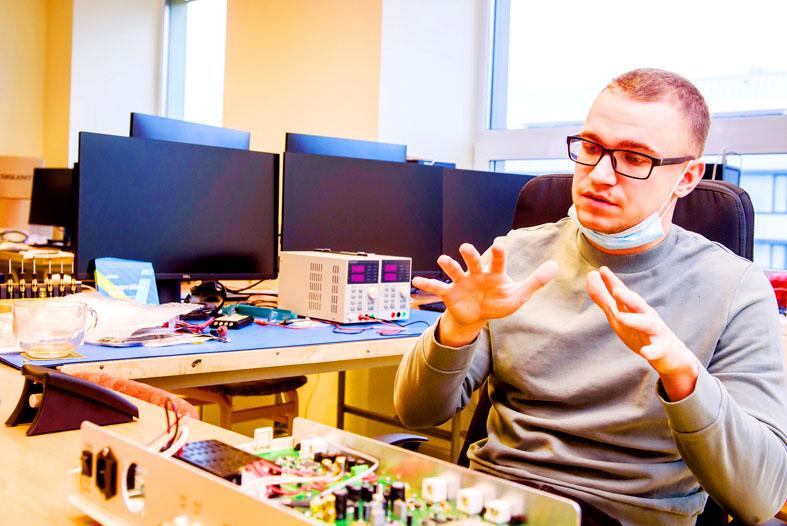In a corner of the campus at Riga Technical University, a team of scientists is working on technology that could one day stop asteroids from smashing into Earth.
The high-precision timers being built by hand in the laboratory of Latvian start-up Eventech are currently being used to track satellites.
The company earlier this year won a European Space Agency (ESA) contract to develop timers that would study the possibility of redirecting an asteroid before it comes too close to our planet for comfort.

Photo: AFP
NASA plans to launch the first part of the Asteroid Impact and Deflection Assessment mission — known as the Double Asteroid Redirection Test — on July 22 next year on a Space X Falcon 9 rocket.
The 500kg camera-equipped probe is to fly to an asteroid named Didymos and smash into it, trying to blow it off its current course that will see it pass near Earth sometime in 2123.
Eventech’s deep space event timers are being developed for the follow-up HERA mission, which is planned to launch five years later, to determine if the first mission succeeded.
“Our new technology that will follow on the second ESA spacecraft named HERA will measure if the first impact steered the kilometer-sized Didymos off its previous course, avoiding harm to humanity,” Eventech engineer Imants Pulkstenis said.
“It’s much more interesting to boldly go where no man has gone before than to manufacture some mundane consumer electronics for huge profit,” he added, borrowing the famous slogan from Star Trek, the 1960s science fiction TV series.
Eventech’s timers are part of a space technology tradition in the Baltic state stretching back to Soviet times when Sputnik — the first manufactured satellite to orbit the Earth — was launched in 1957.
They measure the time needed for an impulse of light to travel to an object in orbit and back.
Eventech devices can record the measurement to within a picosecond — or one-trillionth of a second — which allows astronomers to convert a time measure into a distance measurement with up to 2mm of precision.
About 10 of the timers are produced every year and they are used in observatories around the world.
They track Earth’s increasingly crowded atmosphere, filled with a new crop of private satellites alongside traditional scientific and military ones.
“Tracking them all requires tools,” Eventech chief operations officer Pavels Razmajevs said.
Eventech’s engineers said that they use analogue parts as much as possible, mainly because microchips take nanoseconds to compute the signal, which is too long for incoming measurements ranging in picoseconds.
While these timers are used for calculations on Earth, a different appliance for space missions is being developed in another corner of the same laboratory to track planetary objects from a moving space probe.
“There is no GPS data coverage available on other planets, so you have to take your own precision ranging with you,” Pulkstenis said.
Developing devices for space would be a complex task, but one Eventech’s engineers are relishing.
“Our updated technology has to withstand extreme temperatures in space and extreme cosmic radiation,” Pulkstenis said. “It’s a fun challenge.”

MONEY GRAB: People were rushing to collect bills scattered on the ground after the plane transporting money crashed, which an official said hindered rescue efforts A cargo plane carrying money on Friday crashed near Bolivia’s capital, damaging about a dozen vehicles on highway, scattering bills on the ground and leaving at least 15 people dead and others injured, an official said. Bolivian Minister of Defense Marcelo Salinas said the Hercules C-130 plane was transporting newly printed Bolivian currency when it “landed and veered off the runway” at an airport in El Alto, a city adjacent to La Paz, before ending up in a nearby field. Firefighters managed to put out the flames that engulfed the aircraft. Fire chief Pavel Tovar said at least 15 people died, but

South Korea would soon no longer be one of the few countries where Google Maps does not work properly, after its security-conscious government reversed a two-decade stance to approve the export of high-precision map data to overseas servers. The approval was made “on the condition that strict security requirements are met,” the South Korean Ministry of Land, Infrastructure and Transport said. Those conditions include blurring military and other sensitive security-related facilities, as well as restricting longitude and latitude coordinates for South Korean territory on products such as Google Maps and Google Earth, it said. The decision is expected to hurt Naver and Kakao

Australian Prime Minister Anthony Albanese yesterday said he did not take his security for granted, after he was evacuated from his residence for several hours following a bomb threat sent to a Chinese dance group. Albanese was evacuated from his Canberra residence late on Tuesday following the threat, and returned a few hours later after nothing suspicious was found. The bomb scare was among several e-mails threatening Albanese sent to a representative of Shen Yun, a classical Chinese dance troupe banned in China that is due to perform in Australia this month, a spokesperson for the group said in a statement. The e-mail

LIKE FATHER, LIKE DAUGHTER: By showing Ju-ae’s ability to handle a weapon, the photos ‘suggest she is indeed receiving training as a successor,’ an academic said North Korea on Saturday released a rare image of leader Kim Jong-un’s teenage daughter firing a rifle at a shooting range, adding to speculation that she is being groomed as his successor. Kim’s daughter, Ju-ae, has long been seen as the next in line to rule the secretive, nuclear-armed state, and took part in a string of recent high-profile outings, including last week’s military parade marking the closing stages of North Korea’s key party congress. Pyongyang’s official Korean Central News Agency (KCNA) released a photo of Ju-ae shooting a rifle at an outdoor shooting range, peering through a rifle scope